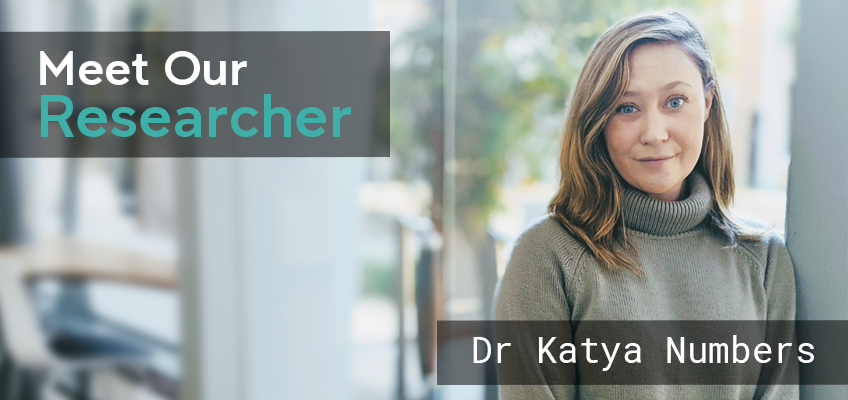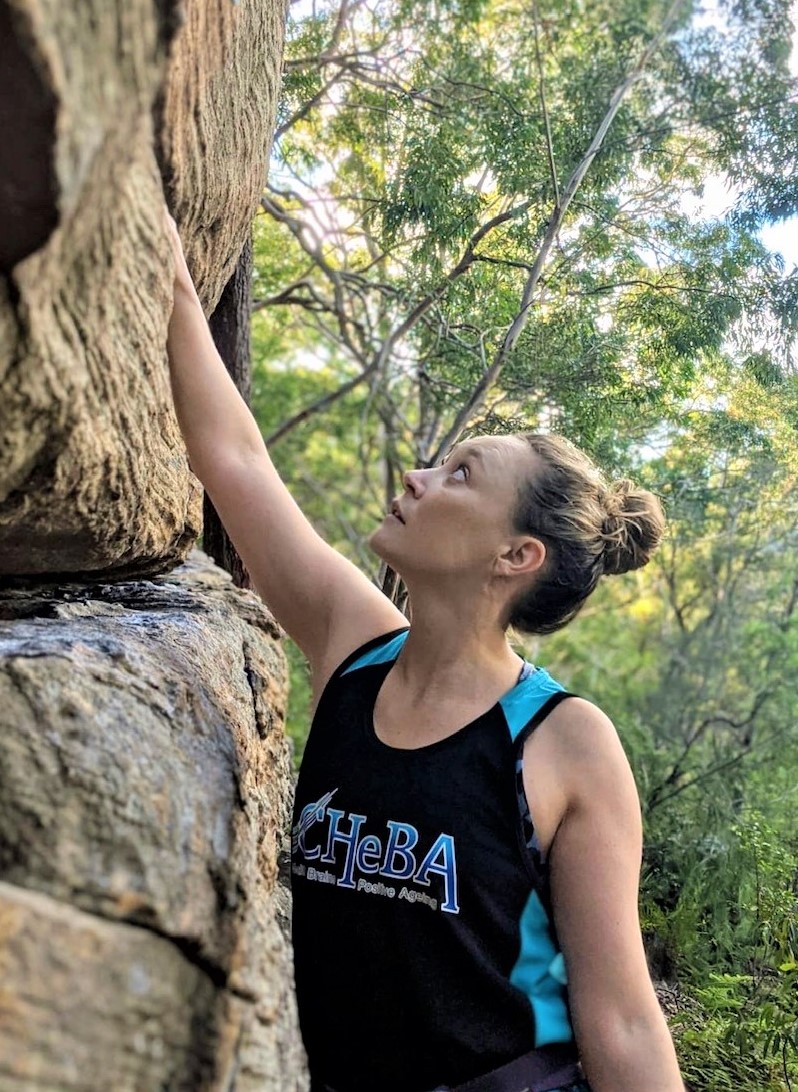20 May 2020

Changing the stereotypical narratives of ageing throughout the lifespan is what motivates Dr Katya Numbers, Coordinator of CHeBA’s Sydney Memory and Ageing Study (MAS). Though we cannot expect an entirely positive experience of ageing, the key is to hold more realistic views so that we can welcome and embrace growing older. Much of Dr Numbers’ work examines the discrepancy between subjective impressions of cognitive decline and objective measures of cognitive performance in older adults.
How did you get into researching the ageing brain?
It has been somewhat of a long and strange journey. By 2011 I had completed both Bachelor’s and Master’s degrees in Experimental Psychology, but transitioned to studying how both younger and older participants viewed older adults’ memory ability whilst doing my PhD on the role of stereotypes in perceptions of memory in old age. Unfortunately, there are a lot of negative stereotypes surrounding the credibility of older adults’ memory in comparison to younger adults. These ageing stereotypes form from as young as seven years old and continue to be expressed implicitly and explicitly across the lifetime. Ironically, this is the one stereotyped group each and every one of us will become part of at some point - if we are lucky. This is significant given research suggests that how we feel personally about ageing happens to matter - a lot, in fact. Studies show that viewing ageing in terms of decline or disability has a negative impact on our physical, emotional, and psychological health over the lifetime.
Through this research and working with older adult participants in both the laboratory and their homes, I became fascinated by perceptions of older adults’ cognitive abilities and ultimately how they view themselves. From this, my focus shifted toward older adults’ subjective impressions of their own memory performance and what the role of depression and anxiety plays in this context. Accepting my role at CHeBA was a way to continue working with studies exploring cognitive ageing and to focus on the subjective component – the intriguing interplay with ourselves and memory.
Did you experience a 'defining moment' which led you to this field?
In 2015 I was working with the AIBL Study in Melbourne and we became extremely close with our older participants. There was one woman who was particularly nervous, anxious and worried about her memory and who performed quite poorly on our tests. She was also the president of the Victorian Lyrebird Society and one day she took us on a tour of her property. During that walk it was evident that her recall of the specific birds, including names and when and where they were born, was excellent and in stark contrast to her performance during testing. During this same period, I had also been witnessing something similar firsthand with my own grandfather. For both, their anxiety was unmistakably alleviated when in their own environments, and their memory and recall far greater. It was this moment that inspired me to propose including subjective questionnaires in our testing protocol to investigate whether participants’ feelings were interacting with their memory at testing.

Do you have any personal interests or activities which are protective behaviours against cognitive decline?
I exercise a lot and try to maintain a healthy Mediterranean style diet. I love playing board games and doing crossword puzzles. Now that we are spending more time at home, I intend to do these things more often, as well as reinstate practicing French and finally learning to play my mandolin.
What are you currently researching?
My focus right now is primarily on subjective complaints research. A recent publication of mine explored predictions of cognitive decline based on participants’ perspectives of their own memory compared to their nominated family member’s or carer’s perspective of their memory. Now I am starting to look at the stability of subjective complaints over time and whether patterns of change - increasing or decreasing complaints - are more predictive of decline and dementia. Another interesting project I am involved in is using machine learning to extract different patterns in older adults’ speech to see if these can predict cognitive decline.
Why is your research important?
In the early 2000’s, the narrative from the research was that subjective cognitive complaints were not related to cognitive performance or dementia. Consequently, a large group of individuals were labelled as ‘worried well’ by GPs and clinicians and were dismissed for being overly anxious about their declining cognition. However, now longitudinal studies like MAS and AIBL are showing there are long-term outcomes associated with these complaints. To elaborate, I genuinely feel older people have insight into what is happening in their own brains and consciously notice real memory changes that can be hard to detect using standard tests. Dementia patients I have spoken with have expressed their gratitude for this new narrative and a deep sense of frustration at their earlier dismissal.
What do you love about working at CHeBA?
The environment at CHeBA is supportive and collegial. I enjoy having the opportunity to work across multiple projects other than the study I manage, and we consistently and regularly invite one another to collaborate on various papers or grants. This creates a highly engaging environment of shared ideas and opportunities. Everyone is passionate about their research, but also supportive of each other’s research and always willing to share ideas and information.
Study participants are undeniably another reason I love my job. Even though these incredible individuals have been volunteering their personal time to MAS for over fourteen years, I still get many asking what else they can do and what more they can do to help our research. This unrelenting level of enthusiasm and dedication constantly inspires me.
When I talk about looking forward to the ageing process, I draw a great deal of inspiration from those people I have met through our research projects. Age is not an "arc" it's a "staircase" - it categorically does not need to be a negative narrative.
What is the ultimate hope you have for your research?
That we move towards more positive perceptions of ageing. I want to use research to change the narrative of ageing for myself, for my mother, for our participants, for my colleagues, for their children and so on. From forgetful and feeble to wise and knowledgeable – we hold both negative and positive stereotypes of ageing. Some demographics model this positive narrative exceptionally well, even in Australia. Consider the reverence Indigenous Australians hold for their elders; these positive views of ageing do exist in many cultures where younger people genuinely look forward to becoming an older adult pillar of their community. From my perspective this societal shift is achievable but requires a reconsideration of the way in which we think about the ageing process and what it means to ‘be old’. This somehow needs to be implemented early on in life.
Changing the conversation around ageing is irrefutably on my agenda over the next couple of years.
This interview was undertaken during the COVID-19 self-isolation period. Dr Katya Numbers found that having video calls with her family and friends and getting to the park for some daily exercise and Vitamin D, has supported her mental resilience and kept her feeling socially connected while physically isolated.
Donations are fundamental for critical research to continue following COVID-19.
If you would like to discuss supporting Dr Numbers’ work specifically, or would like information
on leaving a legacy via a Gift in your Will, please contact h.douglass@unsw.edu.au.

Dr Katya Numbers is a Postdoctoral Fellow and the Study Coordinator of CHeBA’s Sydney Memory and Ageing Study which began in 2005. Since its inception, the study has included over 1,000 Sydney resident older adults and is one of the largest longitudinal ageing studies in Australia. Dr Numbers has a PhD in Cognitive Science from Macquarie University and a Master of Science in Cognitive Psychology. Prior to joining CHeBA, she worked extensively with older adult participants as part of both epidemiological and experimental research. Dr Numbers has a personal interest in promoting the benefits of embodying positive views of ageing across the lifespan.
